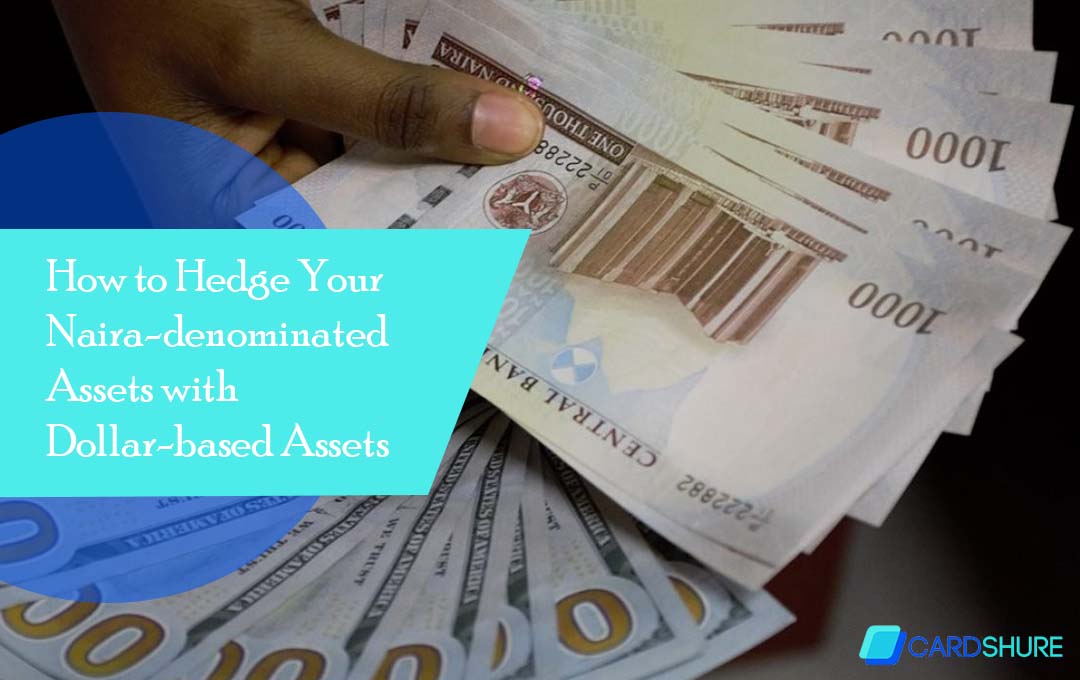At the moment, naira is currently not in a good spot as it is trading close to its all-time lows. In just a year, Naira has gone down over 49%. The naira traded at just N735 per Dollar on January 1, 2023, is now being traded for over N1100 per Dollar.

A lot of investors that stored their wealth in Niara have experienced some major decline and, in a bid, to safeguard their naira-based assets, a lot of investors have turned to a risk management approach called hedging. This content is here to guide you on the steps on How to Hedge Your Naira-denominated Assets with Dollar-based assets, this process would be very beneficial to you.
What is Hedging?
Hedging can be seen as a wealth preservation strategy to save assets from depreciation by taking on opposite investments in assets that are related. The goal of hedging is not to get wealth but to mitigate losses from an existing bad investment.
Let’s say a particular stock is failing, and you have several units of that stock, you can choose to open a leverage short position, and profit from this short position will cover up for the losses incurred from the depreciation of the stock.
Also, Hedging is a common strategy for currency pair speculators because instead of leaving assets denominated in a particular currency, speculators can reduce their risk by diversifying to other stronger currencies. This simply means that investors can take advantage of strength in foreign economies and currencies especially that of the US Dollar.
Great Dollar Assets to Hedge Against Naira Depreciation
Dollar Funds
Any investment fund regardless of the investor’s home currency, that is priced and traded in US dollars is known as a dollar fund. For instance, banks like Stanbic IBTC. offer funds denominated in dollars while being largely Nigerian companies.
The fact that the rewards are also paid in dollars makes these dollar funds intriguing. To get an idea of how important this is, let’s examine this situation.
Strategies for Hedging
Asset Allocation
Asset allocation is a hedging method that is designed to mitigate risk and further enhance portfolio diversification. Some business owners and speculators might decide to allocate a particular percentage of their assets to two opposing assets in other to mitigate risk.
The premise for that particular strategy is that the belief in the medium to long term, the dollar will outperform the naira.
Futures and options
Excellent substitutes for futures and options in terms of hedging are derivatives. Contracts known as derivatives are linked to assets and move in lockstep with their underlying assets.
Derivatives, however, can be exchanged both ways. For futures contracts, long and short, and trading options, call and put.
Trading on haven assets
Assets known for holding their value when other assets are losing value are known as haven assets. Haven investments such as the US dollar, gold, silver, and other precious metals are excellent choices for hedging. If your initial investment depreciated, the gains from their appreciation would lessen your losses.
Risks involved in hedging
Basis risk:
When the price fluctuations of the hedged asset and the selected hedging instrument are not appropriately connected, basis risk in hedging occurs.
Losses could result from this. Due to this disparity, the hedge might not offer total protection against unfavorable developments in the market.
Increased hedging costs:
As we’ve seen, involving a third party—a financial advisor, a bank, or a broker—is a common practice for most of the hedging strategies discussed in this article.
These are not gratuitous services! Hedging carries certain dangers, one of which is this. The benefits of hedging may be diminished by outrageous broker commissions, outrageous consultation costs, and unstated fees.
Deciding when to remove hedges:
You need to have excellent timing if you’re going to be successful at investing or speculating! You must be able to sort through and make sense of the complex information that the markets and economy are providing!
Ultimately, this ought to assist you in determining when to open and exit your investing positions. This also holds for hedging. Hedging may be costly, as we saw in the last section, so you want to be careful to close your hedged position when it no longer makes sense.
